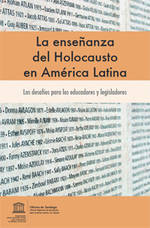In Guatemala Nine Latin American countries present progress on education on the Holocaust and genocide
- The Central American country hosted the 5th Meeting of the Latin American Network for Education on the Holocaust and Genocide. The participants highlighted the importance of education on these issues in order to address difficult pasts.
- The event also included workshops for teachers, a sub-regional meeting for Central America and an international conference on the role of the police in the Holocaust.
31.05.2018 -Mass atrocities such as the Holocaust and genocide are historical experiences from which one can learn in order to ensure that they are not repeated and to promote education for citizenship, human rights and a culture of peace. Based on this premise, UNESCO’s 5th Meeting of the Latin American Network for Education on the Holocaust and Genocide was held May 28, 2018.
The fifth Meeting brought together high-level technical representatives of the Education Ministries of Argentina, Chile, Colombia, Costa Rica, El Salvador, Guatemala, Mexico, Paraguay and Uruguay, the focal points that comprise the network. The meeting was also attended by researchers from network member organizations such as the Shoa Foundation of the University of Southern California and Facing History and Ourselves, who presented proposals for collaboration with UNESCO member states who are part of the network.
The meeting, which was held through the support of Guatemala’s Education Ministry, presented the importance of further developing the network as one of its conclusions. The entity will be strengthened through the development of a strategic proposal to address difficult pasts through education on the Holocaust and other mass atrocities, which will include future actions of cooperation among the countries of the region.
Representatives of the countries who attended the meeting presented the progress made and activities conducted in the context of the educational policies focused on teaching about the Holocaust and genocide, reaffirming the importance of education on these topics in addressing the countries’ difficult pasts.
Nicolás Pons, the representative of Uruguay’s Ministry of Education and Culture at the meeting, said that, “Regional cooperation on matters related to education on the history of human rights violations in Latin America plays a key role in addressing situations related to the countries’ recent pasts, tragic episodes that are carefully addressed in keeping with the historical facts and in an effort to generate educational processes that promote citizen responsibility.” Pons also emphasized the level of connection that the Network promotes to the topic, developing capacities in each educational system and coordinating in a flexible manner based on each country’s specific contexts.
Salvadoran historian and teacher trainer Miguel Ángel Aguilar said, “The week was rich in learning, methodological strategies and the strengthening of connections and friendship among the participants thanks to the firm support of UNESCO and the Guatemalan Ministry of Education. The main beneficiary of this event was Latin American education.”
Workshop for teachers and teacher trainers and other activities
During that same week, UNESCO provided support for the sub-regional workshop on teacher training “Holocaust Education in Latin America: Tools, Challenges and Strategies,” which was held on May 29, 2018 and was organized by the US Holocaust Memorial Museum and the Guatemala Holocaust Museum with funding from Yahad-In Unum, an entity that works to prevent genocide and mass violence. The activity brought together trainers and teachers of history, the humanities, the social sciences and civic education from Guatemala, El Salvador and Costa Rica.
The workshop explored pedagogical tools for teaching about the Holocaust through the interpretation and contextualization of local realities in order to address specific experiences through the teaching of world history events such as genocides and other human rights violations. One of the materials that was analyzed in depth was the UNESCO publication Education about the Holocaust and preventing genocide: A policy guide, which analyzes the main goals of lessons on these topics and approaches to them within citizenship education.
After two days focused on the network meeting and development of teacher training capacities, the International Conference on the Police and the Holocaust: The Role of Police Forces in the Jewish and Gypsy Genocides was held May 30 and 31. The event featured renowned researchers, academics and experts who have focused on the study of the Holocaust in Europe. They discussed the details of the process at the political, social and cultural levels. The conference was organized by the Jack, Joseph and Morton Mandel Center for Advanced Holocaust Studies, the Levine Institute for Holocaust Education of the United States Holocaust Memorial Museum and the Holocaust Museum of Guatemala. It was sponsored by UNESCO Paris.
Más información:
- Education about the Holocaust and preventing genocide: A policy guide (pdf)
- Education about the Holocaust and Genocides (OREALC/UNESCO Santiago)
Contact us:
Nicolás del Valle, Focal Point, Regional Bureau for Education in Latin America and the Caribbean
OREALC/UNESCO Santiago
n.del-valle(at)unesco.org
Karel Fracapane, Focal Point for Education about the Holocaust and Genocides
UNESCO Paris
k.fracapane(at)unesco.org




